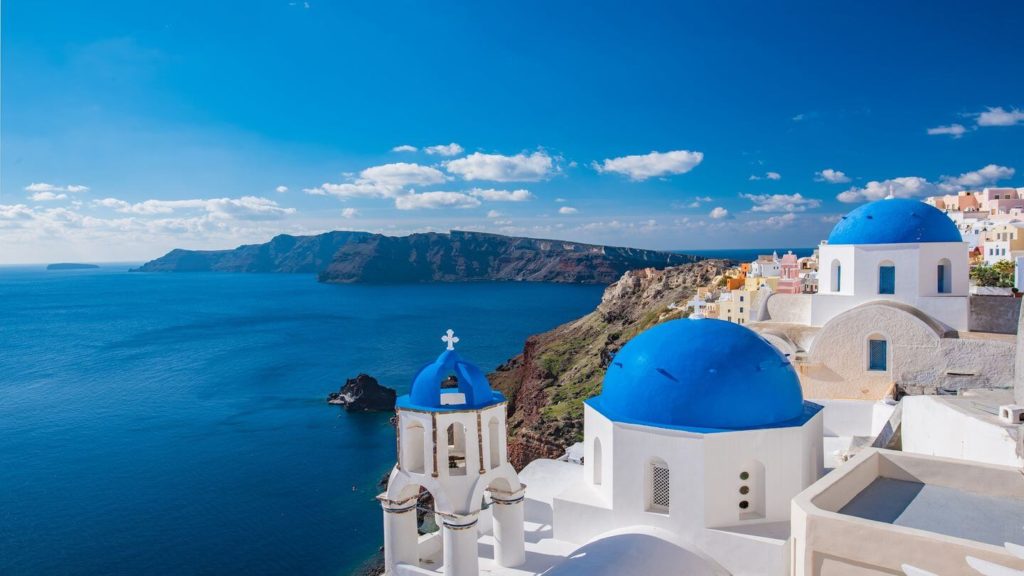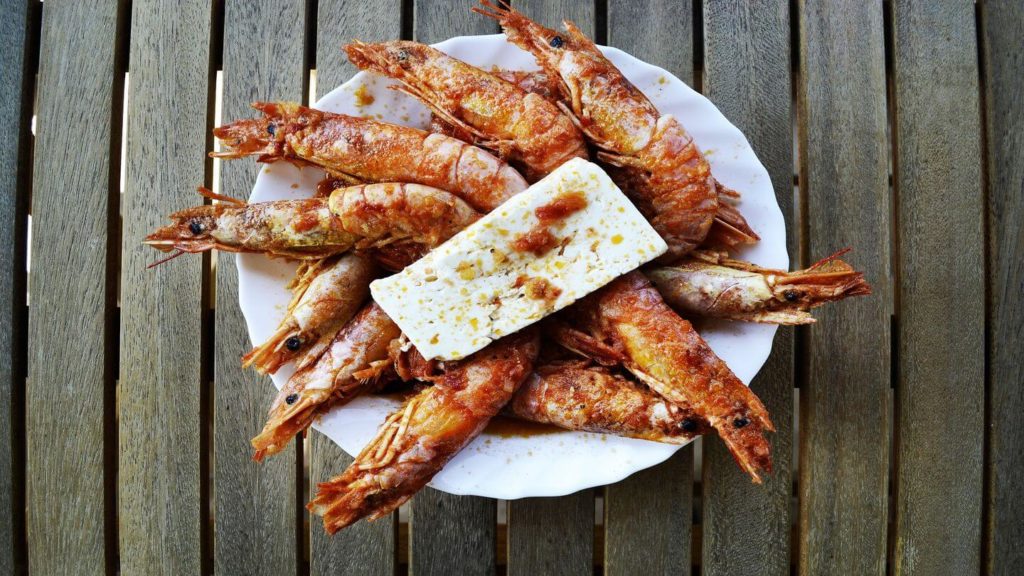Recently updated on July 28th, 2023 at 02:45 pm
From ancient wonders to gleaming white beaches, Greece has it all. But how to explore this country, with hundreds of historic sites and enough sparkling islands to suit everyone? Read our guide to Greece, to help first-time visitors navigate these legendary lands.
Best places to visit in Greece
Athens


Ancient Athens is the springboard to Greece, with most first-time visitors arriving and departing through the capital. This vibrant city is filled with ancient treasures like the sacred Acropolis, with its Parthenon and sculpted maiden Caryatids holding up the roof of the Erechtheion temple.
Check out the Acropolis Museum sitting just below, before taking an easy walk down to the Ancient Agora, where Socrates once discussed his philosophy. From there your guide to Greece can point you in the direction of other historic wonders, like the Temple of Zeus (once the largest temple in Greece). You can also see the Royal Palace, and the Panathenaic Stadium, where the first modern Olympics was held in 1896.
Don’t forget to explore the ancient Roman sites including Hadrian’s Arch and the Roman Agora, with its Tower of the Winds. After exploring all the famous sights, why not watch the pom-pom march of the Evzone guards at the Tomb of the Unknown Soldier. Or stroll through the pretty Plaka neighbourhood and people watch in Syntagma Square.
GET INSPIRED: Best of Greece
Corinth


Cross the mighty Corinth Canal to the stunning Peloponnesian Peninsula, where you’ll find a land of ancient legends. Corinth was once one of the most powerful cities in the classical world and was fought over by several empires throughout the centuries.
You can visit the sacred Temple of Apollo, climb the fortified hilltop of Acrocorinth, and explore the fascinating Corinth Archaeological Museum.
Mycenae
Once a mighty kingdom of Ancient Greece, Mycenae is now an important archaeological site filled with treasures. You can see the Lion Gate and Agamemnon’s Royal Palace, and the Beehive Tombs (the Treasury of Atreus). This was where the fearless Greek leader Agamemnon was laid to rest.
You can also see the massive Cyclopean walls, said to be built by the mythical Cyclops. Visit the nearby Archaeological Museum for more historic excavations.
Epidaurus


Visit Epidaurus to see the ancient Theatre of Epidaurus and the Sanctuary of Asclepius, the God of Medicine. His snake-entwined staff remains the symbol of medicine to this day. You can take to the stage and marvel at the incredible acoustics that once entertained over 14,000 spectators.
Olympia


Cross the Mountains of Arcadia to ancient Olympia, where sacrifices were once made to the gods. It’s also where athletes competed in the world’s first Olympic Games in 776 BC. Visit the city’s fascinating museum and the ruins of the Temples of Zeus and Hera. Wander the ancient Olympic stadium, where you can imagine athletes racing in honour of Zeus.
Delphi


Walk in the footsteps of the ancient Greeks, who once visited the sanctuary of Delphi to consult with the most important oracle of the classical world. You can follow the Sacred Way to the 4th-century Temple of Apollo, and see the statues that immortalise the strength of the athletes who competed in the Pythian Games. The games were founded in the 6th-century and held competitions for art and dance in honour of Apollo.
Thermopylae


Named after its hot sulphur springs, Thermopylae is the mythical cavernous entrance to Hades. It’s also famed as the site where Leonidas and his 300 Spartans fought bravely against the invading Persians. Your guide to Greece can take you on a tour of the historic battlefield. You can also visit the memorial of Leonidas and the Spartans.
Meteora


Meteora is famed for its UNESCO World Heritage monasteries that cling impossibly to massive boulders overlooking the town. You can visit two of the six Eastern Orthodox monasteries, and admire the incredible view from the top of the rock towers.
Corfu


Board a ferry to the stunning island of Corfu, where you’ll find beautiful beaches, splendid architecture and lush valleys. Stroll through the Spianada, one of the largest squares in Greece. Visit the Venetian Castle and the Monastery of Paleokastritsa to meet the Orthodox Monks who live there.
Explore the Phaeacian-styled Achilleion Palace, built by Elizabeth “Sissi” Empress of Austria and Hungary. She adored Greek culture so much that she built a magical summer retreat. You can wander the Imperial Gardens and see the spectacular views of the valley and the shimmering Ionian Sea.
Santorini (Thira)


When you think of Greece, you’re probably thinking of Santorini. With its whitewashed facades topped with bright blue domes overlooking the picture-perfect Aegean Sea, Santorini is one of the most beautiful places in Greece.
All great guides to Greece include a stop in Santorini. You can while away your days with sunbathing on the gorgeous beaches and wander the pretty streets of Oia. Or, explore the island’s ancient ruins and the volcanic caldera.
You can even visit a local winery to learn about the art of winemaking on the island. Or take a caique (sailing boat) to the volcanic island of New Kameni to soak in its hot springs filled with healing properties. Don’t forget to pause and take in the glorious sunsets that light up Santorini each evening.
Mykonos


Known as the island of glitz and glamour, Mykonos is the perfect place to kick back and relax in Greece. You can spend your days lounging at the beach clubs, sipping champagne in the Little Venice waterside, or dancing the night away with the rich and famous. We also love getting lost in the labyrinth laneways of Mykonos Town (Hora), lined with whitewashed cottages and bright pink bougainvillaea.
If you tire of the late night lifestyle easily, the island also has its own dose of history to explore. On a small nearby island, you’ll find the ancient shrine of Delos, the mythical birthplace of Apollo and Artemis, two of the most important Greek gods. You can also visit the 17th-century Church of the Paraportiani, the Aegean Maritime Museum and the Archaeological Museum for some seaside history.
Best things to do in Greece
See the Temple of Poseidon


Join your guide to Greece for a drive down Cape Sounion to see the 5th-century Temple of Poseidon. You’ll marvel at the rugged beauty of the coastline and the temple perched above a 60-metre drop to the Aegean Sea below.
You can see the spot where Byron carved his initials in one of the temple’s 16 columns. Or stand above the site of the world’s first lighthouse, where King Aegeas tragically threw himself into the sea below, giving his name to the Aegean Sea.
RELATED CONTENT: Seeking out the ancient temples of Greece
Take part in a traditional Greek wedding
Your guide to Greece will take you to a traditional Greek wedding show, where you’ll meet the family, witness the life-changing ceremony, and eat, drink and dance the night away. You’ll even get to partake in the Greek custom of breaking plates, believed to keep evil spirits away as the couple embark on their new married life together. Opa!
Go ‘caique’ sailing
Board a traditional Greek Corfiot ‘caique’ boat for a relaxing afternoon of sailing the east coast. You’ll start from the old port of Corfu town and sail the stunning coast towards Barbati beach.
Take a refreshing dip in the Ionian Sea, enjoy the natural beauty of Corfu, and keep your eyes peeled for local marine life like dolphins and monk seals. You never know when they might pop up to say ‘yasou’.
What to eat in Greece
The Greeks are known for their delicious cuisine, with fresh Mediterranean ingredients and rich flavours. Some of their best traditional dishes include moussaka, gyros, souvlaki, dolmadakia, baklava, olives and feta cheese…and that’s just the start!
You’ll find incredible Greek food all over the country, but our guide to Greece reveals some of our favourite ways to experience this wonderful cuisine.
‘Meze’ style dinner


One of the best ways to taste Greek dishes is to dine ‘meze style’, where many dishes are served in the centre of the table. We recommend dining ‘meze style’ in a restaurant in the Psiri area of Athens, where you’ll see the Acropolis illuminated in beautiful lights after dark.
Traditional Greek taverna


Visit a traditional taverna for excellent Greek food in a lively atmosphere. You’ll be entertained by Greek music and dance from all over the country, while local beer and wine flow throughout the night. Ya mas!
Seafood dinner


You can’t leave Greece without trying a real Greek seafood dinner. Head to a local seaside taverna and eat as the locals have since ancient times. Fill your plate with Greek salad and grilled fish, fresh from the Aegean Sea. The fish is usually grilled whole and drizzled with lemon and olive oil. Pair with a glass of local wine, and you’ve got an incredibly tasty meal.
Greek coffee


When in Greece, you must stop and enjoy a coffee in the sun. Greeks have a beloved coffee culture that’s all about sitting down and chatting with friends for hours over a strong beverage. Relaxing with a coffee and watching the world go by is an experience not to be missed in Greece.
What to know about Greece before you visit
It’s all Greek to me
Greek is the official language of Greece, however many Greeks can also speak English as well as a few other languages. We recommend learning a few words in Greek (or even the letters of the Greek alphabet). You don’t need to become fluent, but even just a few basic phrases will help you connect with the locals and earn you a few smiles!
Greeks love to eat together


Greeks are incredibly social and hospitable and they love to share a meal together. Don’t be surprised if meals with locals last for a few hours, or if the owner of a local taverna brings out a bottle of wine to share while you chat.
Dress appropriately
It’s okay to dress casually at the beach or when exploring cities, but when visiting churches, monasteries and sacred sites, you should always cover your arms, legs and midriff. The dress code at religious sites is strict, and they sometimes provide the necessary wraps if you need.
Mind your hands
There are two hand gestures that are considered rude in Greece and may cause unintentional offence. Always avoid holding your hand up with the palm out, and never flash an OK sign by making a circle with your thumb and forefinger.
Greeks love to party


Partying could be considered a national sport in Greece. The endless sunshine and beautiful scenery make for merry conditions, and people often stay outdoors until 10pm even on a weeknight. The weekend nights are even longer. While most people across the world are heading home around midnight, the Greeks are just getting started. Be prepared to head home around sunrise after a night of fun with the locals!
Bargaining and tipping
You don’t need to haggle in Greece as most shops have fixed prices. As for tipping, it’s not essential, but it’s always much appreciated by taxi drivers and service staff. Most restaurant bills include a service charge, so if you want to tip, rounding up the bill is generally enough.
Do you have any top travel tips for Greece? Let us know in the comments below…